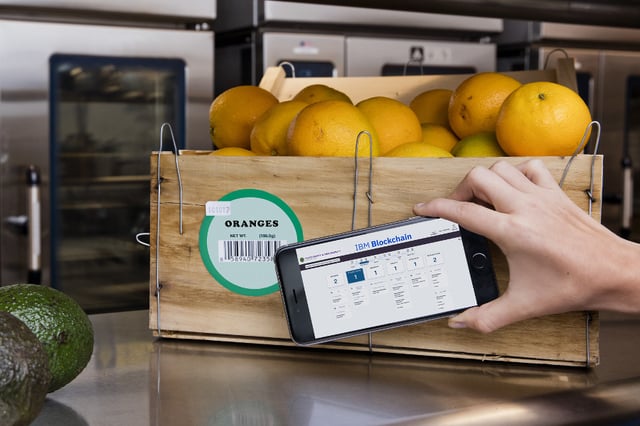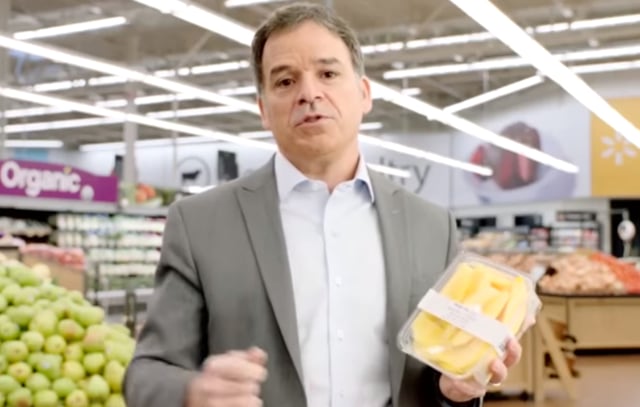Walmart, Kroger Team with IBM to Secure Food Chain
The Kroger Co. and Wal-Mart Stores Inc. are two of a group of food retailers and CPGs across the global supply chain that are partnering with IBM in a major blockchain collaboration to further strengthen consumer confidence in the global food system.
Along with Dole, Driscoll’s, Golden State Foods, McCormick and Co., McLane Co., Nestlé, Tyson Foods, and Unilever, the two retailers will work with the Armonk, N.Y.-based technology company to identify new areas where the global supply chain can benefit from blockchain technology, which can be used to improve traceability by providing trusted information on the origin and state of food.
Annually, one in 10 people fall ill – and 400,000 die – due to contaminated food. Many of the critical issues impacting food safety – such as cross-contamination, the spread of foodborne illness, unnecessary waste and the economic burden of recalls – are magnified by lack of access to information and traceability. It can take weeks to identify the precise point of contamination, causing further illness, lost revenue and wasted product.
“Blockchain is a digital ledger that allows different segments of the food system to capture information about the product, what they’ve done to it, where that product has been,” said Frank Yiannas, VP, food safety at Bentonville, Ark.-based Walmart. “If we’re linking that data with other data points, the Internet of Things, all that information will yield to insights that will allow us to have a safer, more affordable and sustainable food system. But we don’t believe traceability is the goal – we believe that transparency is the ultimate goal.”
Blockchain establishes a trusted environment for all transactions, enabling all participants in the global food supply chain – growers, suppliers, processors, distributors, retailers, regulators and consumers – to gain permissioned access to known and trusted information regarding the origin and state of food for their transactions. This can enable food providers and other members of the ecosystem to use a blockchain network to trace contaminated product to its source in a short amount of time to ensure safe removal from store shelves and stem the spread of illnesses.
To accelerate adoption, IBM is introducing the first fully integrated, enterprise-grade production blockchain platform, as well as consulting services, that will allow more organizations to quickly activate their own business networks and access the vital capabilities needed to successfully develop, operate, govern and secure these networks. The IBM Blockchain Platform is available via the IBM Cloud.
Extensively tested and piloted, the platform addresses a wide range of enterprise pain points, including both business and technical requirements around security, performance, collaboration and privacy that are unique to the technology. It includes innovation developed through open-source collaboration in the Hyperledger community, including the newest Hyperledger Fabric v1.0 framework and Hyperledger Composer blockchain tool, both hosted by the Linux Foundation.
The integrated platform allows multiple parties to jointly develop, govern, operate and secure blockchain networks to help enterprises accelerate blockchain adoption.
"Blockchain technology enables a new era of end-to-end transparency in the global food system – equivalent to shining a light on food ecosystem participants that will further promote responsible actions and behaviors,” Yiannas said. "It also allows all participants to share information rapidly and with confidence across a strong, trusted network. This is critical to ensuring that the global food system remains safe for all."
In parallel trials in China and the United States, IBM and Walmart recently demonstrated that blockchain can be used to track a product from the farm through every stage of the supply chain, right to the retail shelf, in seconds instead of days or weeks. These trials also demonstrated that stakeholders throughout the global food supply chain view food safety as a collaborative issue, rather than a competitive one, and are willing to work together to improve the food system for everyone.
"Safety is a key value for Kroger, and our partnership with IBM positions us to explore and test blockchain technology as a solution for enhanced food safety across our business," said Howard Popoola, Kroger VP of corporate food technology and regulatory compliance. "Food safety is a universal priority for food retailers and companies. It's not a competitive advantage; it benefits our customers to have greater transparency and traceability in the supply chain."


